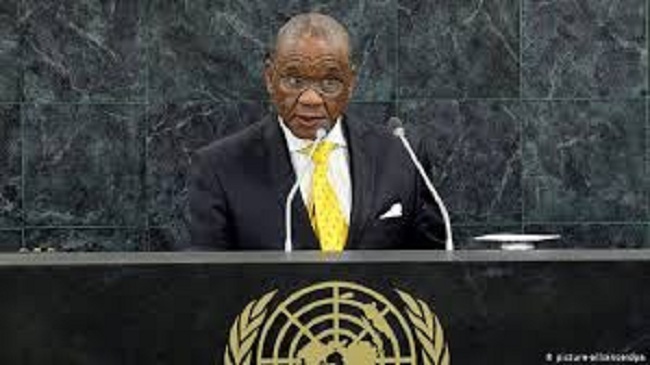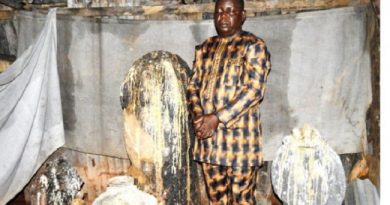Reasons Behind Lesotho Prime Minister’s Resignation Emerge
The Lesotho Prime Minister, Thomas Thabane on Monday announced his resignation following months of pressure in which he was named as a prime suspect in the murder of his ex-wife.
Prime Minister Thomas Thabane said he would resign this week, after clinging to Lesotho’s highest political office for months.
Mr. Thabane, 80, a wily political survivor who has served in every administration since the tiny southern African nation gained independence in 1966, had tried to remain in power despite mounting pressure from his own camp to leave.
Evidence links the prime minister to the assailants who killed his estranged wife, Lipolelo Thabane, in June 2017, the authorities say.
Mr. Thabane’s current wife has already been charged in the death, and investigators say phone records show ties between the prime minister and the gunmen.
For months Mr. Thabane brushed off calls to resign as he suspended Parliament, deployed the army and attempted to arrest those behind the investigation.
But on Monday, he handed his resignation letter to King Letsie III, according to Mr. Thabane’s secretary, Thabo Thakalekoala. The resignation is effective on Wednesday, he said.
The accusations against Mr. Thabane and the political upheaval they created unfolded as the country faces the threat of the coronavirus.
Until last week, Lesotho was the only African nation not to have reported any Covid-19 cases.
In South Africa, which encircles the country of 2.2 million with porous borders, there have been over 15,500 confirmed coronavirus cases and with numbers accelerating in recent days which has recorded 264 deaths already.
Moletsane Monyake, a lecturer in political science at the National University of Lesotho, said the authorities in Lesotho had failed to focus on the pandemic.
“The government has been so engrossed in political bickering that attention has been diverted from the Covid-19,” Mr. Monyake said. “But the truth is, Lesotho has been flying blind in its response to the pandemic.”
But in the end, all Mr. Thabane did was buy some time, experts and politicians in the opposition say.
For years, he and his estranged wife had been embroiled in a dispute over the legal details of their divorce, with Lipolelo Thabane clinging to the benefits attached to the title of the first lady — even as Mr. Thabane lived with his fiancée, Maesaiah.
Lipolelo was killed near her home outside Maseru, the capital, on June 14, 2017, two days before Mr. Thabane was sworn into office. He married Maesaiah later that summer.
While the news shocked the tiny nation, it took over two and a half years for the police to disclose that they had evidence that Mr. Thabane’s phone had been linked to the murder scene.
Maesaiah Thabane, who was charged in the killing in February, has denied the accusations. Mr. Thabane has also denied any involvement, and his supporters say the accusations were a conspiracy to oust him.

The gunmen fled to South Africa and remain at large, according to Mr. Mokete.
When the prime minister appeared in court in February, his lawyer argued that he could not be charged while he was still in office, and the case was sent to the country’s constitutional court.
In a telephone interview, Teboho Mojapela, the businessman and a campaign donor to Mr. Thabane’s party, said that he met the prime minister and his fiancée at a Chinese restaurant in Maseru on June 14, 2017, after meeting earlier in the day at his house with Lipolelo Thabane. She told him she would agree to the divorce as long as she kept getting financial support, said Mr. Mojapela, who is known as “J.P.”
At the restaurant, Mr. Mojapela said Maesaiah gave him her blessing to pursue the negotiations. “She said, ‘J.P., go back to her and ask what exactly she wants,’” Mr. Mojapela said.
What Mr. Mojapela did not know, he said, was that as he met with the couple in the early evening, gunmen were attacking Lipolelo Thabane in her car.
Mr. Thabane’s resignation might mean he can now be formally charged, but experts were uncertain. Some believe that Mr. Thabane might have negotiated a deal under which the charges would be dropped in exchange for his early departure.
Still, his resignation closes a chapter in Lesotho’s young political history.
After holding various government positions over four decades, Mr. Thabane rose to the top political office in 2012. He led the country until 2015, and after two years in the opposition, was elected again in 2017.

“His second term, like his first term, came with the promise of fighting corruption and changing Lesotho’s politics,” said John Aerni-Flessner, an associate professor of African History at Michigan State University, and an expert on Lesotho. “Neither brought these changes.”
In April, after Lesotho’s constitutional court deemed the suspension of Parliament ordered by Mr. Thabane to be invalid, the prime minister deployed the army on the streets of Maseru to act against what he called “rogue national elements.” The tanks were gone by the evening, but a South African delegation had to later broker talks between Mr. Thabane and his political rivals. Lesotho is economically dependent on South Africa, which in turn relies on mountainous Lesotho’s abundant water to supply cities like Johannesburg.
“Lesotho has seen multiple peaceful handovers of the prime minister’s office through elections,” Mr. Aerni-Flessner said, “but these handovers and early general elections have come at the cost of governance.”
“If you’re always transitioning,” he said, “no one is governing.”
Lynsey Chutel reported from Johannesburg and Elian Peltier from Paris.




